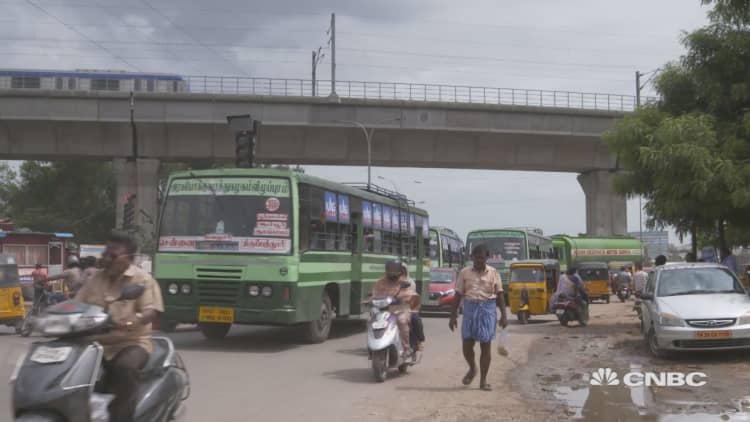
Located on the shores of the Bay of Bengal in south India, authorities in Chennai — one of India's biggest cities — are looking to transform its public spaces and the way people move around its streets.
A crucial cog in this attempt to drive change is Chennai Smart City Limited.
"The smart city mission is basically the central government's way to kind of catalyze urban change, changes in urban governance and so on, so that we can achieve a higher level of quality of life in Indian cities," Raj Cherubal, the company's CEO, told CNBC's "Sustainable Energy."
A key goal of the mission is to boost the quality of life in Indian cities. "Public space is increasingly seen across the world as a fundamental part of quality of life," Cherubal said.
"So in India itself, for example, Pune, Chennai, and various other cities have tried very hard to open up public spaces. It's not just parks, it's also footpaths and placemaking around footpaths so that excess land or underutilized land is used."
It's within this context that the Greater Chennai Corporation has developed a Non-Motorized Transport policy. One mode of clean transport being looked at is a cycle-sharing scheme involving 5,000 bicycles housed across 378 stations citywide.
Such a program would see Chennai follow in the footsteps of cities like London and Paris, where cycle-sharing schemes have become a cheap, clean and convenient means of transport for many.
According to Chennai Smart City Limited, the city will adopt a dockless sharing system using lightweight single rider bikes. Users of the scheme will be able to obtain information on bike locations and availability via a web portal and mobile app.
"Cycle-sharing should be seen as a very key component of… 'last mile' connectivity," Cherubal said. "Some experiments done by Metro Rail seem to be very promising, where children are able to go take a metro rail, take the cycle and go to tuition."
"That's just… one example. I think cycle-sharing should be seen in that context, not just leisure but actually a very important component of a bigger sustainable transport policy."





